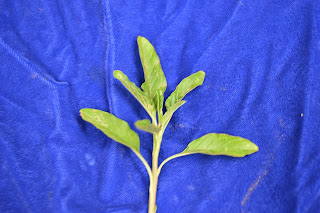In case you are not sure what a waterhemp looks like, here are some pictures:
With continued support from the Illinois Soybean Association, U of I can offer free screening of waterhemp populations for herbicide resistance again this growing season.
To submit samples, follow these directions:
- After applying glyphosate, select five waterhemp survivors in the field.
- Remove the top inch or two from each plant (containing young, newly emerged, healthy leaves), and seal it in a sandwich-sized zip-top plastic bag. Use a separate bag for each plant.
- Place the bags in an envelope and send by overnight delivery to Dr. Chance Riggins, 320 ERML, 1201 W. Gregory Dr., Urbana, IL 61801. Ideally, samples should be sent the same day they are collected, but if necessary, they can be stored for a day or two in a refrigerator (but do not freeze). Do not send samples on a Friday or Saturday.
- Print the following submission form (Adobe PDF) and complete a copy for every field sampled.
- The appropriate rate of glyphosate (plus proper adjuvants) was applied at the appropriate weed growth stage.
- Environmental conditions during and after application were conducive for good glyphosate activity.
- Plants that survived the glyphosate application are found next to plants that did not.
- The field has a history of glyphosate use.
Authors:
Pat Tranel
Aaron Hager





No comments:
Post a Comment
Note: Only a member of this blog may post a comment.